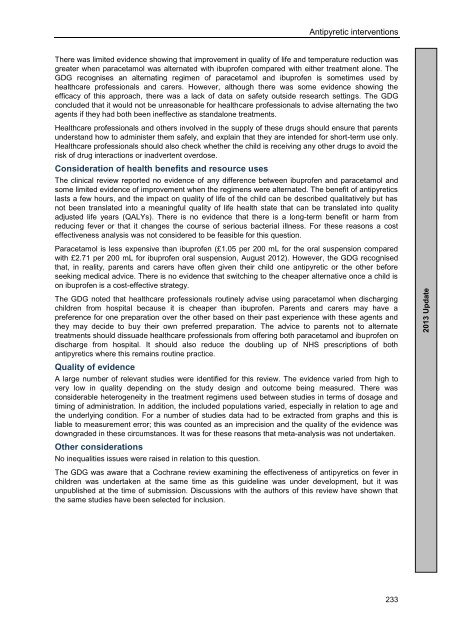A5V4d
A5V4d
A5V4d
You also want an ePaper? Increase the reach of your titles
YUMPU automatically turns print PDFs into web optimized ePapers that Google loves.
Antipyretic interventions<br />
There was limited evidence showing that improvement in quality of life and temperature reduction was<br />
greater when paracetamol was alternated with ibuprofen compared with either treatment alone. The<br />
GDG recognises an alternating regimen of paracetamol and ibuprofen is sometimes used by<br />
healthcare professionals and carers. However, although there was some evidence showing the<br />
efficacy of this approach, there was a lack of data on safety outside research settings. The GDG<br />
concluded that it would not be unreasonable for healthcare professionals to advise alternating the two<br />
agents if they had both been ineffective as standalone treatments.<br />
Healthcare professionals and others involved in the supply of these drugs should ensure that parents<br />
understand how to administer them safely, and explain that they are intended for short-term use only.<br />
Healthcare professionals should also check whether the child is receiving any other drugs to avoid the<br />
risk of drug interactions or inadvertent overdose.<br />
Consideration of health benefits and resource uses<br />
The clinical review reported no evidence of any difference between ibuprofen and paracetamol and<br />
some limited evidence of improvement when the regimens were alternated. The benefit of antipyretics<br />
lasts a few hours, and the impact on quality of life of the child can be described qualitatively but has<br />
not been translated into a meaningful quality of life health state that can be translated into quality<br />
adjusted life years (QALYs). There is no evidence that there is a long-term benefit or harm from<br />
reducing fever or that it changes the course of serious bacterial illness. For these reasons a cost<br />
effectiveness analysis was not considered to be feasible for this question.<br />
Paracetamol is less expensive than ibuprofen (£1.05 per 200 mL for the oral suspension compared<br />
with £2.71 per 200 mL for ibuprofen oral suspension, August 2012). However, the GDG recognised<br />
that, in reality, parents and carers have often given their child one antipyretic or the other before<br />
seeking medical advice. There is no evidence that switching to the cheaper alternative once a child is<br />
on ibuprofen is a cost-effective strategy.<br />
The GDG noted that healthcare professionals routinely advise using paracetamol when discharging<br />
children from hospital because it is cheaper than ibuprofen. Parents and carers may have a<br />
preference for one preparation over the other based on their past experience with these agents and<br />
they may decide to buy their own preferred preparation. The advice to parents not to alternate<br />
treatments should dissuade healthcare professionals from offering both paracetamol and ibuprofen on<br />
discharge from hospital. It should also reduce the doubling up of NHS prescriptions of both<br />
antipyretics where this remains routine practice.<br />
Quality of evidence<br />
A large number of relevant studies were identified for this review. The evidence varied from high to<br />
very low in quality depending on the study design and outcome being measured. There was<br />
considerable heterogeneity in the treatment regimens used between studies in terms of dosage and<br />
timing of administration. In addition, the included populations varied, especially in relation to age and<br />
the underlying condition. For a number of studies data had to be extracted from graphs and this is<br />
liable to measurement error; this was counted as an imprecision and the quality of the evidence was<br />
downgraded in these circumstances. It was for these reasons that meta-analysis was not undertaken.<br />
Other considerations<br />
No inequalities issues were raised in relation to this question.<br />
The GDG was aware that a Cochrane review examining the effectiveness of antipyretics on fever in<br />
children was undertaken at the same time as this guideline was under development, but it was<br />
unpublished at the time of submission. Discussions with the authors of this review have shown that<br />
the same studies have been selected for inclusion.<br />
233<br />
2013 Update


